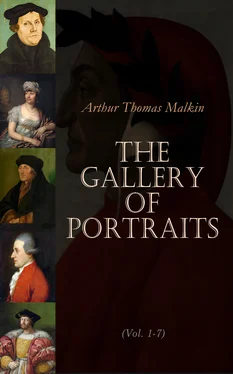The coalition was still in possession of the House of Commons; but the voice of the people supported the minister, a dissolution was resorted to, and the will of the King was accomplished.
From 1784 to 1792, Mr. Fox was leader of a powerful party in the House of Commons, in opposition to Mr. Pitt. The Westminster Scrutiny, the Regency, the abatement of Impeachments by a dissolution of Parliament, the Libel Bill, the Russian Armament, and the Repeal of the Corporation and Test Acts, were the topics which called forth his most powerful exertions. His force as a professed orator was conspicuously displayed in Westminster Hall, on the trial of Warren Hastings; but the triumph of his talents is to be found in those masterly replies to his antagonists, in which cutting sarcasm and close argument, logical acuteness and metaphysical subtlety were so combined, as to surpass all that modern experience had witnessed. The constitutional doctrines of Mr. Fox on the Regency question were much canvassed, and, by many, severely censured. The fact was, that the case was new; provided for neither by law, precedent, nor analogy. Lord Loughborough first suggested the Prince’s claim of right; and it was hastily adopted by Mr. Fox, who had returned from Italy just as the discussion was pending. Mr. Fox’s Libel Bill places him among the most constitutional of our legislators. He saved his country from an unnecessary, unjust, and expensive war, by his exertions on occasion of the Russian Armament.
The controversy on the Test and Corporation Acts has lost its interest, from having since been satisfactorily set at rest. But as, in a sketch like the present, we have more to do with the character of Mr. Fox’s mind than with his political history, we will here introduce an anecdote which the writer of this life heard related many years ago, by Dr. Abraham Rees, well known both in the scientific world, and as a leading divine in the dissenting interest. We have already spoken of the intuitive quickness of Mr. Fox’s parts; and the following anecdote will set that peculiarity in a strong light.
On the day of the debate, Dr. Rees waited on Mr. Fox with a deputation, to engage his support in their cause. He received them courteously; but, though a friend to religious liberty, was evidently unacquainted with the strong points and principal bearings of their peculiar case. He listened attentively to their exposition, and, with an eye that looked them through and through , put four or five searching questions. They withdrew after a short conference, and as they walked up St. James’s Street, Mr. Fox passed them booted, as going to take air and exercise, to enable him to encounter the heat of the House and the storm of debate. From the gallery they saw him enter the House with whip in hand, as just dismounted. When he rose to speak, he displayed such mastery of his subject, his arguments and illustrations were so various, his views so profound and statesman-like, that a stranger must have imagined the question at issue between the high church party and the dissenters to have been the main subject of his study throughout life. That his principles of civil and religious liberty should have enabled him to declaim in splendid generalities was to be expected; but he entered as fully and deeply into the fundamental principles and most subtle distinctions of the question, as did those to whom it was of vital importance, and that after a short conference of some twenty minutes.
The French revolution is a topic of such magnitude, that we can only touch upon Mr. Fox’s opinions and conduct with respect to it. After the taking of the Bastille, he describes it as “the greatest, and much the best event that ever happened in the world: all my prepossessions against French connections for this country will be at an end, and indeed most part of my European system of politics will be altered, if this revolution has the consequence that I expect.” But it had not that consequence; and his views were completely changed by the trial and execution of the King and Queen of France. But because he did not catch that contagious disease, made up of alarm and desperate violence, which involved his country in a disastrous war, he was represented as the blind apologist of injustice and massacre, as the careless, if not jacobinical spectator of the downfall of monarchy. Mr. Burke was the first to quarrel with Mr. Fox, and this quarrel led to the temporary estrangement from him of many of his oldest and most valuable friends. But “time and the hour” restored the good understanding between the members of the party, with the exception of Mr. Burke, who died while the paroxysm of Antigallican mania was at its height.
Mr. Fox opposed to the utmost the war, into which the minister was unwillingly forced. But as his passions became heated, and the difficulties of his situation increased, Mr. Pitt adopted all Mr. Burke’s views, and the rash project of a bellum internecinum . Both the public principles and the personal character of Mr. Fox were the subject of daily calumnies; and the warmth of his early testimony in favour of the French revolution was continually thrown in his teeth, after the 10th of August, the massacres of September, and the success of Dumourier. But his whole conduct during this struggle was clear and consistent. At the dawn of the revolution, he felt and spoke as a citizen of the world; but he was the last man alive to have merged patriotism in the vague generalities of universal benevolence. When his own country became implicated in the strife, he no longer felt and spoke as a citizen of the world, but as a British statesman; and endeavoured to persuade his countrymen, not for French interests but for their own, to stand aloof from continental politics, relying, for the maintenance of a proud independence and dignified neutrality, on their insular situation and their wooden walls. His advice was not listened to, and his mind grew indisposed towards public business. He says in a letter, dated April, 1795, “I am perfectly happy in the country. I have quite resources enough to employ my mind, and the great resource of literature I am fonder of every day.” After making a vigorous, but unsuccessful opposition to the Treason and Sedition bills, he and his remaining friends seceded from parliament. He passed the years from 1797 to 1802, principally in retirement at St. Ann’s Hill; and they were the happiest of his life. His mornings passed in gardening and farming, his evenings over books and in conversation with his family and friends. During this period, his attention was much given to the Greek Tragedies and to Homer, whom he read not only with the ardent mind of a poet, but with the microscopic eye of a critic. His correspondence with an eminent scholar of the time was full of sagacious remarks on the suggestions and explanations of the commentators, as well as on the text of the poem. At this time also he conceived the plan of that history of which he left only a splendid fragment in a state fit for publication. He had been diligent in collecting materials, and scrupulous in verifying them. His partiality for the Greek classics followed him into this pursuit, and probably retarded his progress. He is considered to have taken for his model Thucydides, a writer strictly impartial in his narrative, grave even to severity in his style. He went to Paris with Mrs. Fox in the summer of 1802, partly to satisfy their mutual curiosity after so long an estrangement from the Continent, but principally for the purpose of examining the copious materials for the reign of James II. deposited in the Scotch college there. Every thing was thrown open to him in the most liberal manner, and, as the unflinching friend of peace through good and evil report, he was received with enthusiasm both by the people and the government. He had several interviews with Buonaparte: the chief topics of their conversation were the concordat, the trial by jury, the freedom, amounting in the opinion of the First Consul to licentiousness, of the English press, the difference between Asiatic and European society. On one occasion he indignantly repelled the charge against Mr. Windham, of being accessory to the plot of the infernal machine , alleging the utter impossibility of an English gentleman descending to so disgraceful a device. During his stay in France, he visited La Fayette at his country seat of La Grange.
Читать дальше












